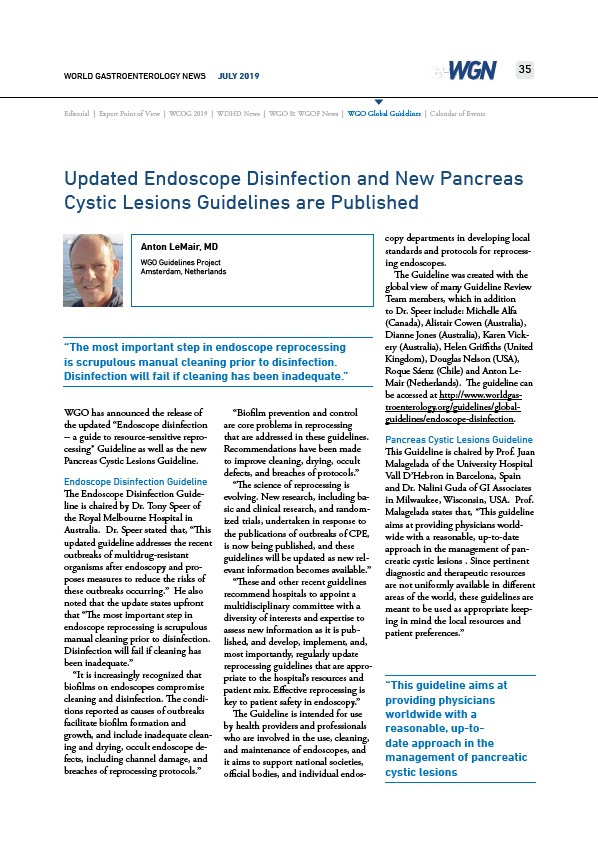
35
WORLD GASTROENTEROLOGY NEWS JULY 2019
Editorial | Expert Point of View | WCOG 2019 | WDHD News | WGO & WGOF News | WGO Global Guidelines | Calendar of Events
Updated Endoscope Disinfection and New Pancreas
Cystic Lesions Guidelines are Published
WGO has announced the release of
the updated “Endoscope disinfection
-- a guide to resource-sensitive reprocessing”
Guideline as well as the new
Pancreas Cystic Lesions Guideline.
Endoscope Disinfection Guideline
The Endoscope Disinfection Guideline
is chaired by Dr. Tony Speer of
the Royal Melbourne Hospital in
Australia. Dr. Speer stated that, “This
updated guideline addresses the recent
outbreaks of multidrug-resistant
organisms after endoscopy and proposes
measures to reduce the risks of
these outbreaks occurring.” He also
noted that the update states upfront
that “The most important step in
endoscope reprocessing is scrupulous
manual cleaning prior to disinfection.
Disinfection will fail if cleaning has
been inadequate.”
“It is increasingly recognized that
biofilms on endoscopes compromise
cleaning and disinfection. The conditions
reported as causes of outbreaks
facilitate biofilm formation and
growth, and include inadequate cleaning
and drying, occult endoscope defects,
including channel damage, and
breaches of reprocessing protocols.”
“Biofilm prevention and control
are core problems in reprocessing
that are addressed in these guidelines.
Recommendations have been made
to improve cleaning, drying, occult
defects, and breaches of protocols.”
“The science of reprocessing is
evolving. New research, including basic
and clinical research, and randomized
trials, undertaken in response to
the publications of outbreaks of CPE,
is now being published, and these
guidelines will be updated as new relevant
information becomes available.”
“These and other recent guidelines
recommend hospitals to appoint a
multidisciplinary committee with a
diversity of interests and expertise to
assess new information as it is published,
and develop, implement, and,
most importantly, regularly update
reprocessing guidelines that are appropriate
to the hospital’s resources and
patient mix. Effective reprocessing is
key to patient safety in endoscopy.”
The Guideline is intended for use
by health providers and professionals
who are involved in the use, cleaning,
and maintenance of endoscopes, and
it aims to support national societies,
official bodies, and individual endoscopy
departments in developing local
standards and protocols for reprocessing
endoscopes.
The Guideline was created with the
global view of many Guideline Review
Team members, which in addition
to Dr. Speer include: Michelle Alfa
(Canada), Alistair Cowen (Australia),
Dianne Jones (Australia), Karen Vickery
(Australia), Helen Griffiths (United
Kingdom), Douglas Nelson (USA),
Roque Sáenz (Chile) and Anton Le-
Mair (Netherlands). The guideline can
be accessed at http://www.worldgastroenterology.
org/guidelines/globalguidelines/
endoscope-disinfection.
Pancreas Cystic Lesions Guideline
This Guideline is chaired by Prof. Juan
Malagelada of the University Hospital
Vall D’Hebron in Barcelona, Spain
and Dr. Nalini Guda of GI Associates
in Milwaukee, Wisconsin, USA. Prof.
Malagelada states that, “This guideline
aims at providing physicians worldwide
with a reasonable, up-to-date
approach in the management of pancreatic
cystic lesions . Since pertinent
diagnostic and therapeutic resources
are not uniformly available in different
areas of the world, these guidelines are
meant to be used as appropriate keeping
in mind the local resources and
patient preferences.”
“The most important step in endoscope reprocessing
is scrupulous manual cleaning prior to disinfection.
Disinfection will fail if cleaning has been inadequate.”
“This guideline aims at
providing physicians
worldwide with a
reasonable, up-todate
approach in the
management of pancreatic
cystic lesions
Anton LeMair, MD
WGO Guidelines Project
Amsterdam, Netherlands